How to Help the Communities Devastated by Hurricane Helene's Catastrophic Deluges
UPDATE 10/4: I encourage you to share this Google Doc with a fantastic array of disaster aid groups at every level in Western North Carolina, which has by far the highest death count from the Hurricane Helene inland flood disaster:
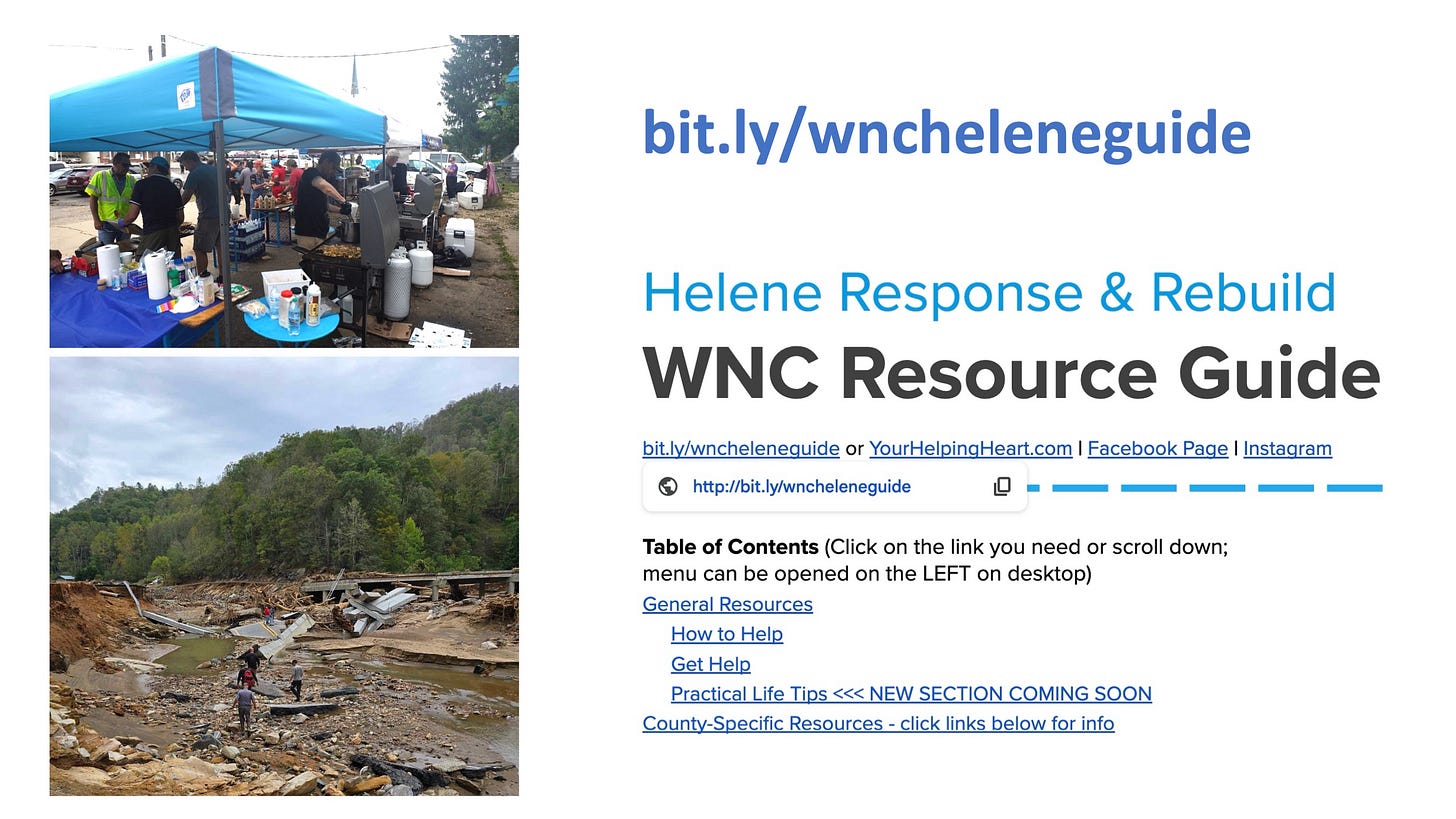
Original post 10/3: I’ve been focused mainly on posting on social media since Hurricane Helene swept inland and catastrophic flooding devastated dozens of communities, large and small, particularly in rugged, corrugated, Appalachian landscapes like those in western North Carolina. The death count of 205 (sure to continue rising) makes this the deadliest hurricane to hit the U.S. mainland since Katrina in 2005.
I’ll soon be posting an overivew that will serve as a running guide to insights on the factors driving the horrifying scope of losses - from climate change to the “expanding bull’s eye” of flood-amplifying asphaltification and development - and pathways to resilience in regions like these.
A nightmarish threat was created by a mix of the storm’s extraordinary rainfall and extent, linked in part to human-driven climate change in initial analyses but also possibly closely matched by flooding events in 1916 and 1791, combined with a decades-long surge of development along river valleys and up hillsides. Here’s one tiny facet of the risk prism around Buncombe County (where 72 deaths have been tallied to date, and 200 people remain unaccounted for [10/4]) via Google Earth Engine’s Timelapse tool (North Asheville):
How to help from afar
But right now the best thing you and I can do is help the rapidly assembling array of volunteers and organizations working nonstop to provide safety, shelter, food, and pathways to eventual recovery. My former Columbia University colleague and friend
, best known for his science and policy expertise around carbon management, has assembled a superb set of links through which donations can flow to effective groups.Find his climate policy advice on Substack at The Work, but first choose an organization below from his list and help (or add a comment with your favorites):
Following the devastating damage from Hurricane Helene to rural communities, I urge you to donate to one of these groups. I donated to the first one - do as you can, and as you must.
Hope Mill, Inc. - Helicopters Dropping Relief is a group of independent helicopter pilots around the Hickory, NC area who are purchasing water and supplies to transport to mountainous areas inaccessible by road. You can support their GoFundMe page here.
https://www.gofundme.com/f/support-hope-mill-incs-hurricane-relief
Operation Airdrop is flying food and critical supplies to rural areas in North Carolina and Florida. You can donate via their website here.
https://operationairdrop.betterworld.org/donate
Hearts With Hands is a local outreach ministry operating around the Swannanoa/Asheville area of Buncombe County, NC. They are asking for financial support as they gather and coordinate delivery of supplies to local residents. You can make a contribution to them here.
https://www.heartswithhands.org/donate
Manna FoodBank in Asheville, NC is a local food bank distributing food, water, and essential supplies like diapers and baby formula to local residents. Financial donations can be made online here.
https://donate.mannafoodbank.org/
Foothills Food Hub is sourcing food and supplies for residents of McDowell County, NC. They are requesting online donations, which can be made via their website here.
https://www.foothillsfoodhub.org
Mercy Chefs serve hot meals to volunteers, first responders, and community members stranded by the disaster in Western North Carolina. They are requesting online donations, which can be made via their website here.
https://mercychefs.com/donate-helene
BeLoved Asheville is collecting and distributing essential supplies and is asking for financial support and local volunteers, especially truck owners and truck drivers. Online donations can be made via PayPal.
https://www.paypal.com/paypalme/belovedasheville
Everyone affected by this devastating hurricane and flooding is in our thoughts. Thank you for joining us in chipping in to donate to some really great organizations.
In a tweet on X, Anna Jane Joyner, who works to boost climate themes in film and television, posted this note about her destroyed homeland:
I'm from Asheville / Black Mountain - the destruction is beyond catastrophic - worse than what you're seeing on the news. If you're looking for places to donate, here are two. Please help if you’re able:
The situation on the ground is a war zone—people urgently need water, food, and gas. My best friend lives there and is organizing relief efforts. Please donate: PayPal: soulandsoilproject@gmail.com Include "Donation for Helene" You will receive a tax-deductible receipt!
It was one of the greatest honors my life to work for Mountain True for 3 yrs, protecting WNC's rivers, forests, mountains, & communities. They now face the worst environmental crisis in WNC's history. The cleanup will be Herculean. Please support this vital work: https://mountaintrue.org/join
Along with donating to Manna Foodbank today, I’m playing at an old-timey musical jam at a friend’s cidery here in Hancock, Maine, tonight raising funds for Appalachian charities working on Helene recovery.
Let me know what you’re doing to help these or other disaster victims.
Flood history resource
To understand the baseline risk of flooding around Asheville, Buncombe County and surrounding steep-sloped, fast-developing regions, I recommend this incredible 1960 (!) Tennessee Valley Authority report: "Floods on French Broad and Swannanoa Rivers around Asheville, North Carolina”:
This gallery of excerpts tells the story of past terrible floods and how asphalt and obstructions like building a landfill in the French Broad River have greatly amplified the threat.
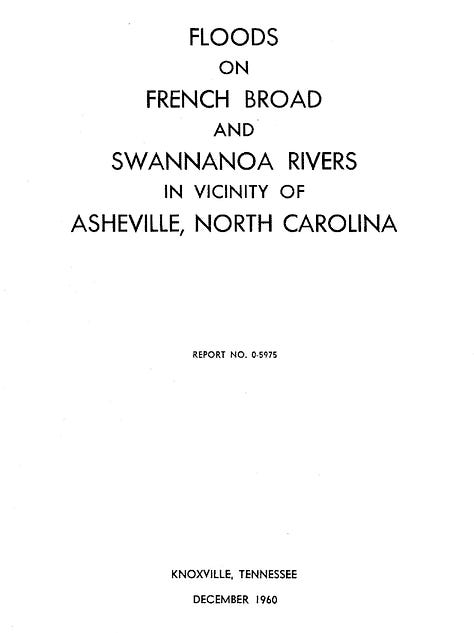
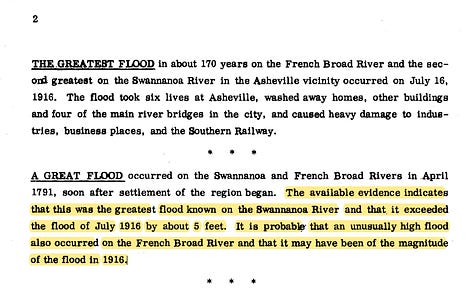
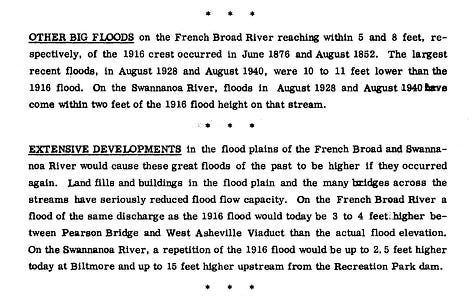
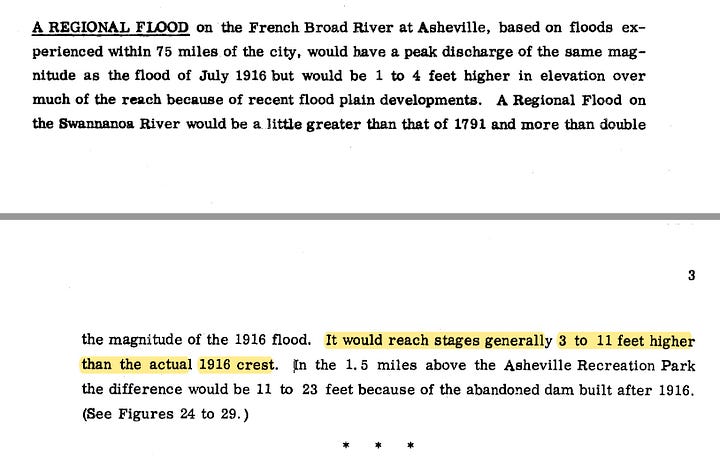
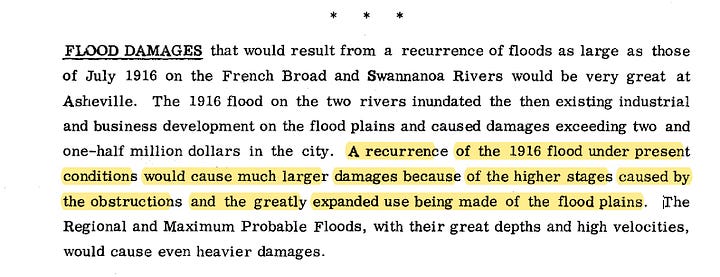
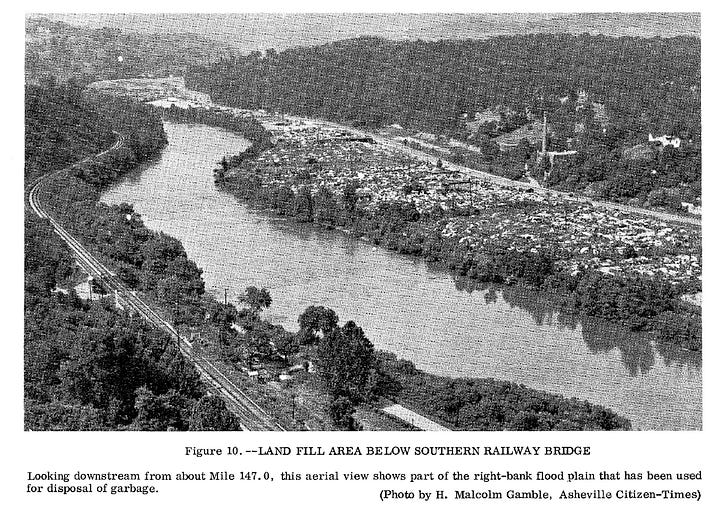
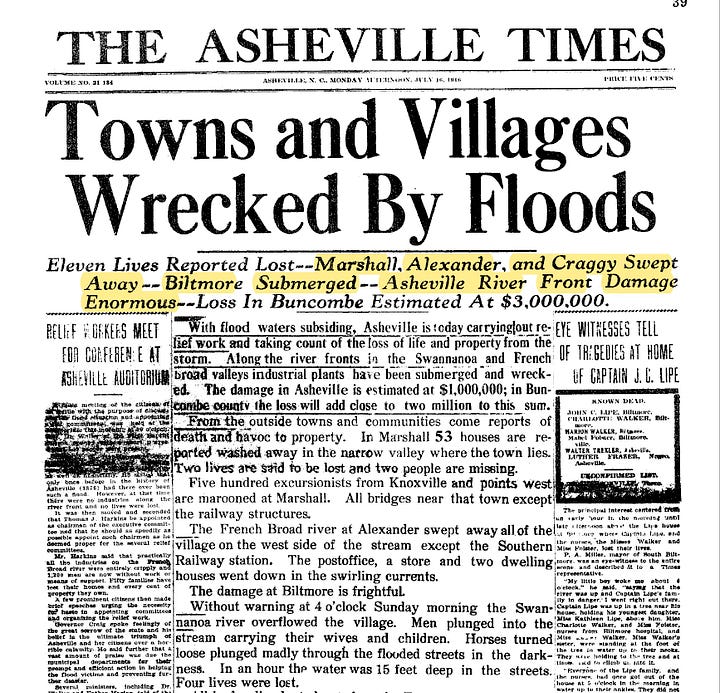
I’m adding a #MindTheGap graphic I made to illustrate the importance of using a long time scale when gauging the risk of a rare extreme meteorological or hydrological event.
Consider becoming a paid subscriber to help me justify the time it takes to do this work.




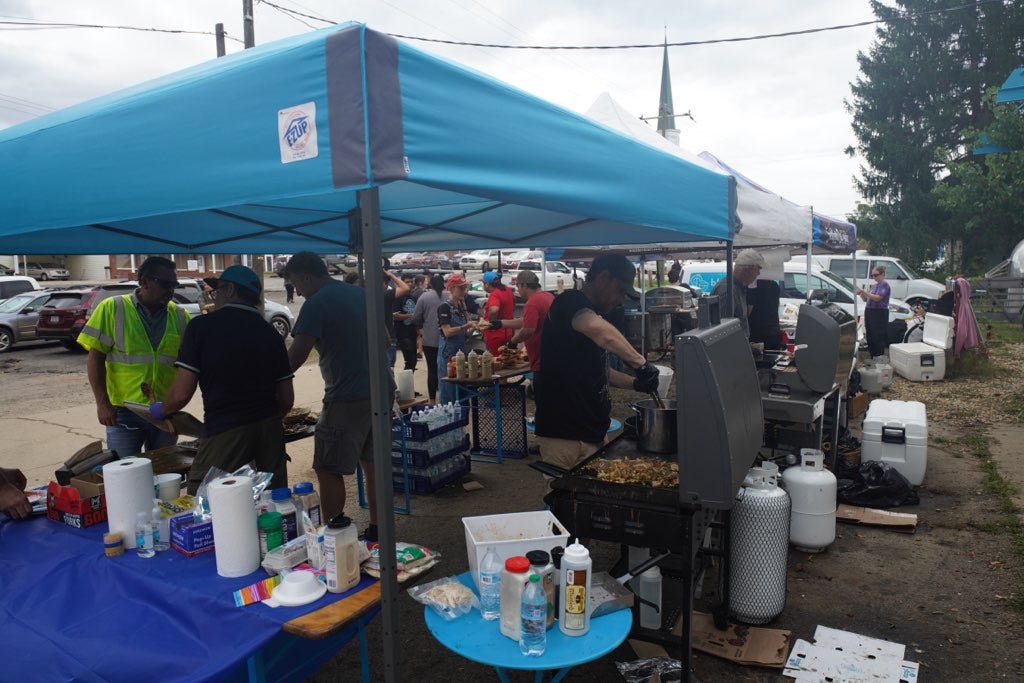
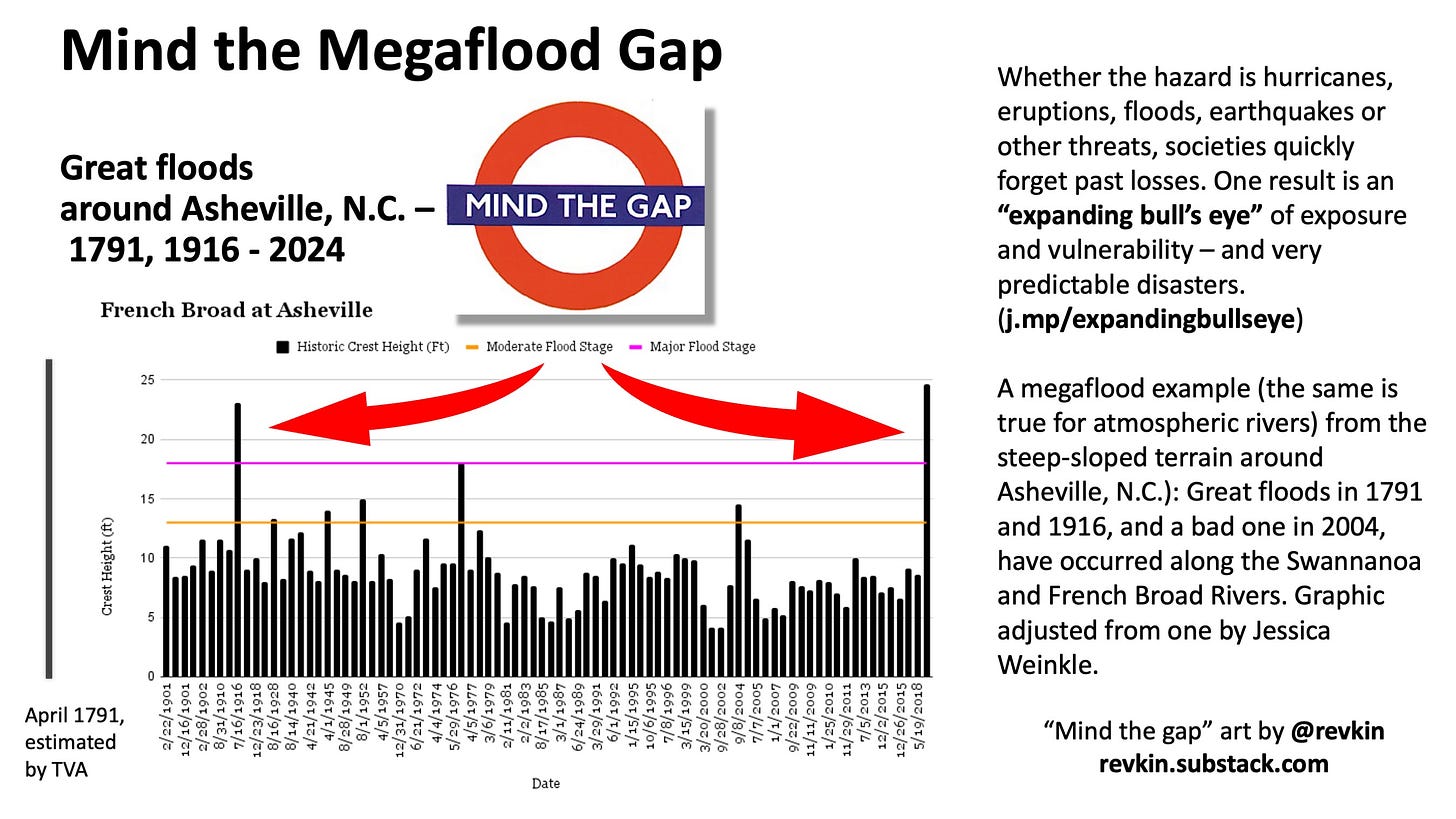
Thank you for providing this opportunity to donate. I've done so.